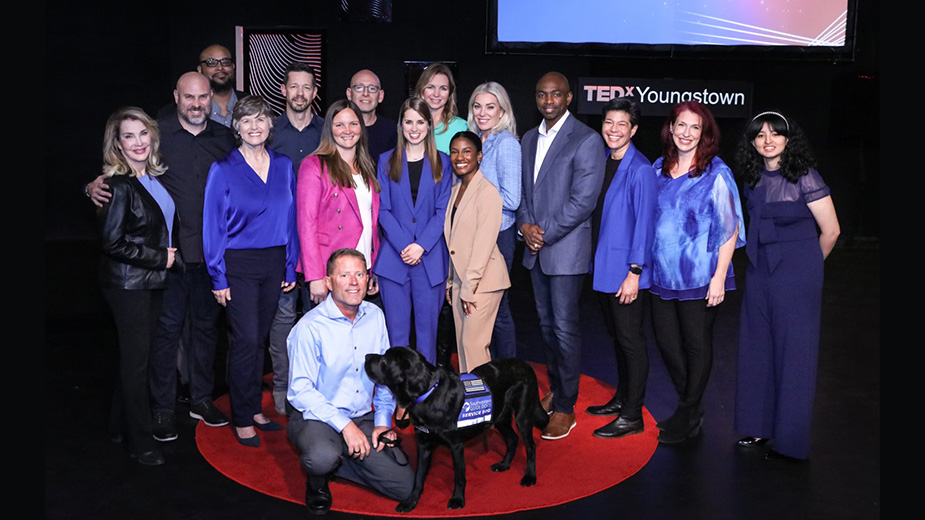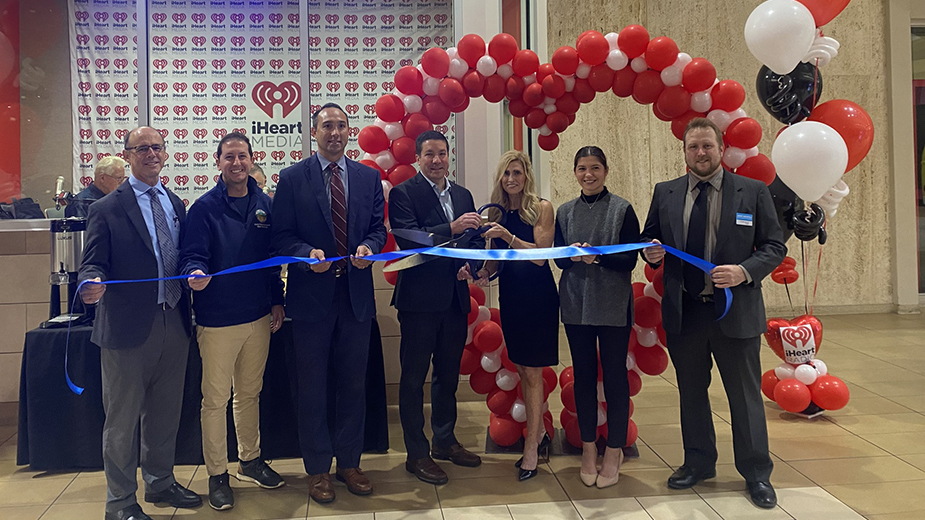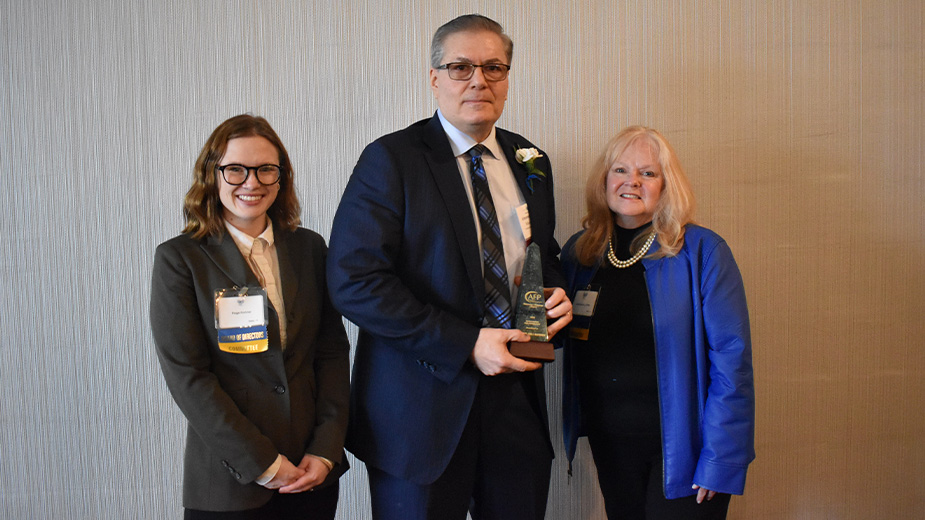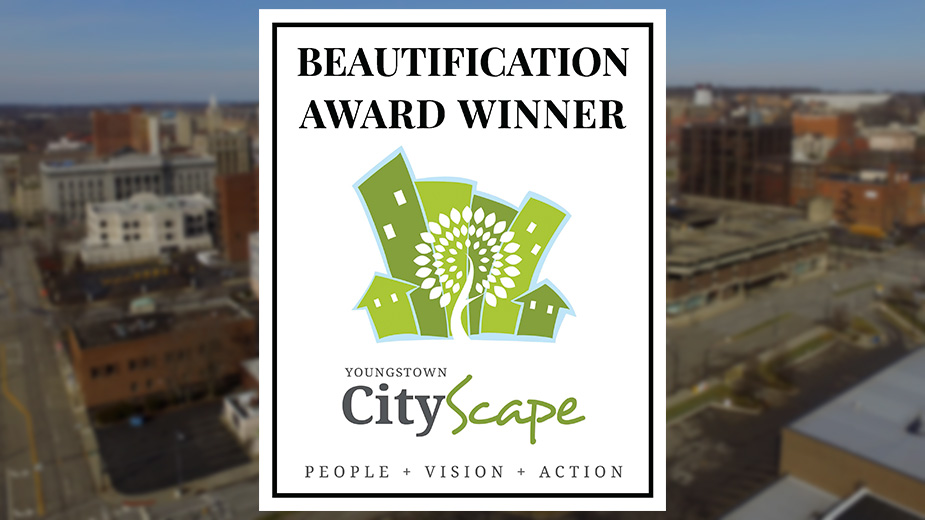Messages of Hope, Perseverance at TEDx Youngstown
YOUNGSTOWN, Ohio – Molly Spearman recalled an incident during her childhood on a cold, rainy morning when the bus she was riding passed three Black children walking to their school.
As the school bus bore down, the Black students had to jump across a ditch to get out of its path.
“Stop! Let’s pick them up. We got plenty of room,” Spearman said to the driver. The driver simply chuckled and replied, “They don’t get a bus. They gotta walk.”
Spearman’s account took place in the 1960s South, when segregation was fully in force.
“I can still see their faces as we passed them by,” she related to an audience Friday at the Spotlight Theater at Youngstown State University’s Bliss Hall. “It haunts me to this day.”
Spearman was among 16 presenters Friday at TEDx Youngstown, an annual event that gives speakers a platform to relate stories of inspiration, compassion, overcoming adversity, technology, leadership and other disciplines.
Reflecting on another moment, Spearman recounted how her father noticed that the 10th grader was feeling uneasy at the dinner table one evening. The next day was the first day of school, and for the first time, three Black children would be admitted.
She told her father she was nervous, since previous attempts at integrating schools in the South were met with hostility and violence – mostly from white adults determined to defend segregation.
“Molly, you go to school tomorrow and you treat everyone just how you want to be treated,” her father stressed. “Get to know your new friends.” And she did.
It was one of many lifelong lessons that Spearman would heed from discussions around the dinner table. The entire class graduated as good, close friends, she recalled.
Her talk Friday emphasized that these simple table discussions have disappeared and that distractions of modern society have instead replaced personal communication.
“Technology consumes us,” she lamented. “We’ve lost the art of conversation. When we dare to have those conversations, we build trust; we strengthen relationships.”
Each of the 16 presentations brought messages of hope, perseverance and how these experiences could help make a difference for others who might be confronting similar circumstances.
Overcoming Bullying
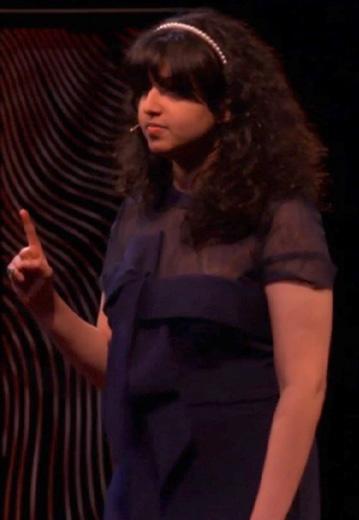
Krishnni Khanna, a high school student in Austin, Texas, told the audience how she overcame bullying from fellow students when she first arrived in California as an immigrant from India. Her classmates constantly ridiculed her for her looks, repeatedly called her “annoying” and thrust other insults upon her.
It became so pervasive that she began to believe them. “I was too young to understand toxic friendships or describe the enormity of my shame,” she said. “Those words were ingrained in my head like tattoos.”
It was Khanna’s first TEDx talk. After two years of struggling, Khanna began to embrace a path of introspection and critical thinking that eventually freed her from the repetitive words that once harmed her. “I started to tell myself the opposite and use my personal experience to back that up,” she said. “My parents like me the way I am. My current friends like me the way I am.”
However, it intrigued her to explore more in depth how repeated falsehoods – absent of evidence, proof and fact – could be regarded as truth. “If we don’t bother to check what we believe, we’re creating a society where lies and truths become easy to confuse, spreading more inaccuracies.”
Connections and Well-being
Others talked about the importance of personal connections and how that can impact a person’s well-being.
Ayana Symone told of her childhood experiences and how that affected her adult life. Retreating into isolation from these issues doesn’t help, she said. Confronting them and engaging others does.
“You’re not protecting yourself,” she said. “Instead, you’re holding yourself back.” Despite past pain, people must work to welcome the rejected and embrace those who also feel isolated. “You cultivate community by going to those on the outside and drawing them in with genuine love and affection.”
Now 23 years old, Symone is an author and blogger, and she hosts a podcast, “To Be Heard.”
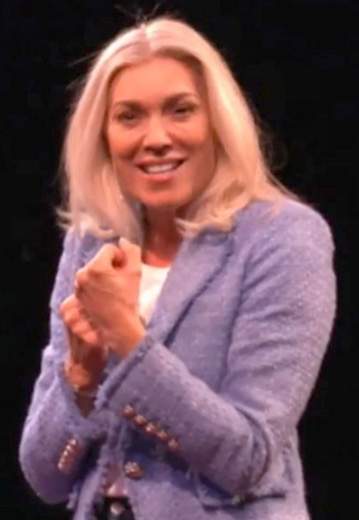
Unni Turrettini, an international speaker and author, first became interested in the concept of loneliness and isolation after a young gunman murdered 77 people in her native Norway in 2011. Turrettini, who lives in Oslo, began to examine the traits of other mass killers and found they were not so different than the rest of society.
“I discovered that they struggled with loneliness, that they thought they didn’t belong in our society,” she said. “I knew that feeling, moving around in other places across the world.”
Human connection is vital to personal health, Turrettini said. Recently, the U.S. surgeon general described loneliness as an “epidemic” that affects approximately half of the U.S. population.
“We’re seeing it in terms of the polarity in the population,” especially in the workplace, she said. “A lot of it stems from loneliness in our society.”
Turrettini has addressed the topic in forums all over the world and organizes workshops for companies – mostly in Europe and the U.S. “If we can transport the workplace into a place of community, we’ve already done a lot to combat the loneliness epidemic.”
Sensitive Matters
Some of the speakers dealt with more sensitive matters. Morgan Watt, a U.S. Air Force veteran and pilot, reflected on his years of dealing with post-traumatic stress disorder and chronic pain. He now travels the country speaking on behalf of veterans issues and advocating for treatment.
During his time in the service, he learned to compartmentalize his pain and emotions, especially as part of a K9 explosive detection team. It also translated into his work as a private pilot flying business jets.
“In three decades of service and leadership, I had many internal and external injuries,” he said. “The evidence of which – it’s not gone. It’s just invisible.”
He became emotional as he recounted the darkest moment in which he contemplated reaching for his 9 mm Beretta. However, his wife, Amber, had removed the weapon. “I wouldn’t be here today,” he said.
He’s since taken solace with Donzi, a service dog that has helped him deal with his pain and who joined him on the TEDx stage. “Donzi is my guardian against an adversary unseen.”
His No. 1 daily battle is with disabling migraine headaches, but also vertigo, PTSD and other illnesses.
Donzi is trained to retrieve medicine should Watt be incapacitated. Moreover, the dog is trained to detect changes in his emotional and physical state and then respond by sharing with him connection. “Anyone dealing with invisible wounds needs connection and safety,” he said.
“Invisible wounds scream in silence, and now’s the time to give them a voice,” he said.
Speakers such as Deanna Simonson spoke on the importance of parenting as a first line of defense against youth suicide, while Eric Hodgdon touched upon how breakthrough moments helped him heal grief. Samantha Kaaua, through video, shared her expertise on new techniques for marriage therapy.
Literacy and Education
Some speakers presented innovative ways to improve literacy and education. Kassi Kincaid of Austin, Texas, for example, described a program she devised called “Book Days,” which comes to life through props and theatrical reading of children’s books to encourage kids to read.
“Today, we’re facing an international literacy crisis,” she said. “Statistics show that kids that don’t read at grade level by the third grade are exponentially more likely to have a harder time of life.”
She implements community programs, hosts a YouTube channel and mentors other educators about how to use her idea. “They implement it themselves and use their own creativity.”
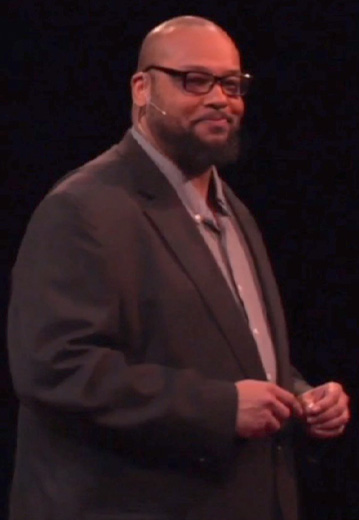
Others emphasized the role of technology and how it plays a positive part in life and education. Jennifer Pintar, interim provost and vice president of academic affairs, explained how new technology such as artificial intelligence can assist higher education. Through AI, colleges and universities are able to reach and assist a more diverse student base.
For Devyn Bellamy of Youngstown, AI is critical to his success as a senior account manager at HubSpot and other marketing endeavors. The technology, he said, has helped remove obstacles such as a learning disability that would otherwise impede his work.
Leadership coach Zach Arend in his talk used a metaphor of the first time he saddled his own horse to empower leadership and accept accountability; nationally known speaker Joe Weston addressed civility and the importance of respectful confrontation.
Curt Thomas, a former state trooper and today a medical officer in the Air Force Reserve, spoke about his life challenges, including failing 9th grade, two divorces and life as a single parent. Today, he is a doctoral candidate in health care administration.
Katy Stevens and Mo Barrett’s talk showed how embracing change and disruption makes one “unforgettable.”
Hearing from Pioneers
Presenters at this year’s TEDx also included pioneers in their respective fields.
Reyne O’Shaughnessy, a former commercial pilot, recounted her career at a time when there were few women in the aviation industry.
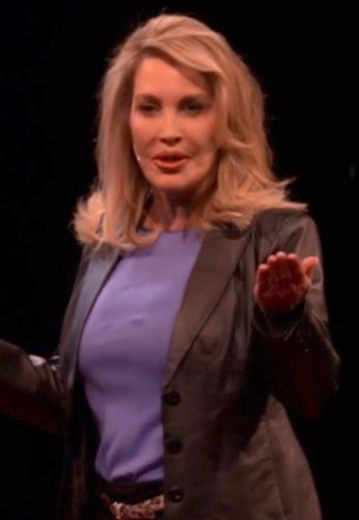
“Today’s women are breaking glass ceilings,” she said. “Thirty, 40 years ago we were kicking down walls.”
O’Shaughnessy’s career has inspired her to talk and write extensively on pilot health. “Pilots are human, and we work in a system that is high-performance, and we struggle, just like anyone else.”
In the past, it was not acceptable to talk about mental health or physical issues, especially in the aviation industry. Many pilots feared that addressing health issues would mean being grounded by an airline.
That stigma is starting to change, however, across many industries, she said. “We are starting to make headway – the needle has moved. We are on the brink of changing safety for today and tomorrow’s aerospace system.”
Pictured at top: In front, kneeling, is Morgan Watt. In the first row, from left, is Rene O’Shaughnessy, Eric Hodgdon, Molly Spearman, Deanna Simonson, Kassi Kincaid and Ayana Symone. In the back row, from left, is Devyn Bellamy, Zach Arend, Joe Weston, Jennifer Pintar, Unni Turrettini, Curt Thomas, Mo Barrett, Katy Stevens and Krishnni Khanna.
Copyright 2024 The Business Journal, Youngstown, Ohio.
